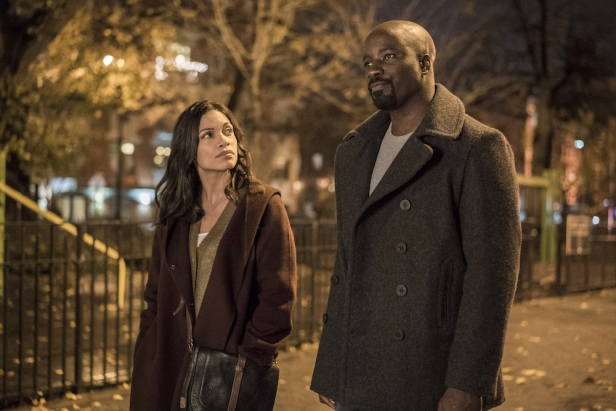Hot on the heels of two critical (and presumably commercial) hits in Daredevil and Jessica Jones, Luke Cage has it all to do while striving to stand out from its predecessors. As it turns out, it could well be the pick of the bunch.
This may be a contentious statement, but for the first ten episodes at least, it’s hard to really find fault with it. One recurring quibble with Marvel’s Netflix output has been its tendency to hit the ground running – albeit way too quickly, leaving relatively minimal plot to be spread across the run time’s second half before being reignited by a bold finale. Luke Cage showrunner Cheo Hodari Coker has clearly been paying attention: pacing-wise, he’s got it spot on, affording precious little space for filler.
With this in mind, the central premise is relatively simple: lying low in Harlem, still bearing his scars from the events of Jessica Jones, Cage (Mike Colter) finds himself drawn into a battle for the streets of Harlem thanks to the collateral damage of mob boss Cottonmouth (Mahershala Ali) and his cousin, scheming politico Mariah Dillard (Alfre Woodard)’s shady dealings landing too close to home to ignore. Before we know it, he’s in full Power Man mode, punching people out and lobbing sofas out of windows for all to see.
Marvel’s Netflix shows have worn their community pride on their jerseys for all to day, but even with this in mind, Luke Cage is unashamedly a far more homespun affair, with the streets of Harlem taking on a whole new life themselves, forming more than just a backdrop for the punch-ups, double-dealings and public-relation battles that characterise the show. This more intimate atmosphere filters down into the show’s themes – in a world of police shootings and Black Lives Matter, Luke Cage is both of the moment and universal, scarily uncanny in its relevance.
Yet more than any other genre, Luke Cage brings its western influences to its fore, giving the form an update in the process. Cage is a sociable Man With No Name taking part in a solo Magnificent Seven – albeit in a world where he is sideswiped by the lack of moral absolutes. For this role, Colter is perfect – likeable and laid back, yet driven by a hunger for social justice, it’s hard to imagine anyone else in the role.
By and large, his supporting cast are similarly committed. Having impressed in a number of film and TV roles, Mahershala Ali’s Cottonmouth is a highlight, wearing his chip on his shoulder for all to see and delivering brutal revenge on anyone who points it out. It’s a performance that should deliver him bigger roles, as is also the case with Woodard. Representing another side of the villainous coin to her on-screen relative, we don’t want to mention too much of her storyline for fears of spoilers, but suffice to say, she’ll get you talking.
Similarly, Simone Missick’s Misty Knight provides a welcome keyhole for us to view the previously unexplored (for Marvel, at least) inner workings of the police force through; Theo Rossi is similarly good value as brooding hitman ‘Shades’, and it’s great to have Rosario Dawson back as Claire Temple, especially when she’s delivering lines like the one knocking back Cage’s attempt to invite her out for ‘coffee’.
It’s only in its ambition that Luke Cage occasionally fumbles. Intent on fleshing out the psychology driving more characters than just Cage, it can feel thinly spread, especially in the final stages. Add in the obtrusively silly final-episode smackdown, and it just serves as a timely reminder that it’s a far better show when it’s embracing its core themes rather than trying to be another superhero show.
Happily, it isn’t just another superhero show; it’s arguably the best one to date.
